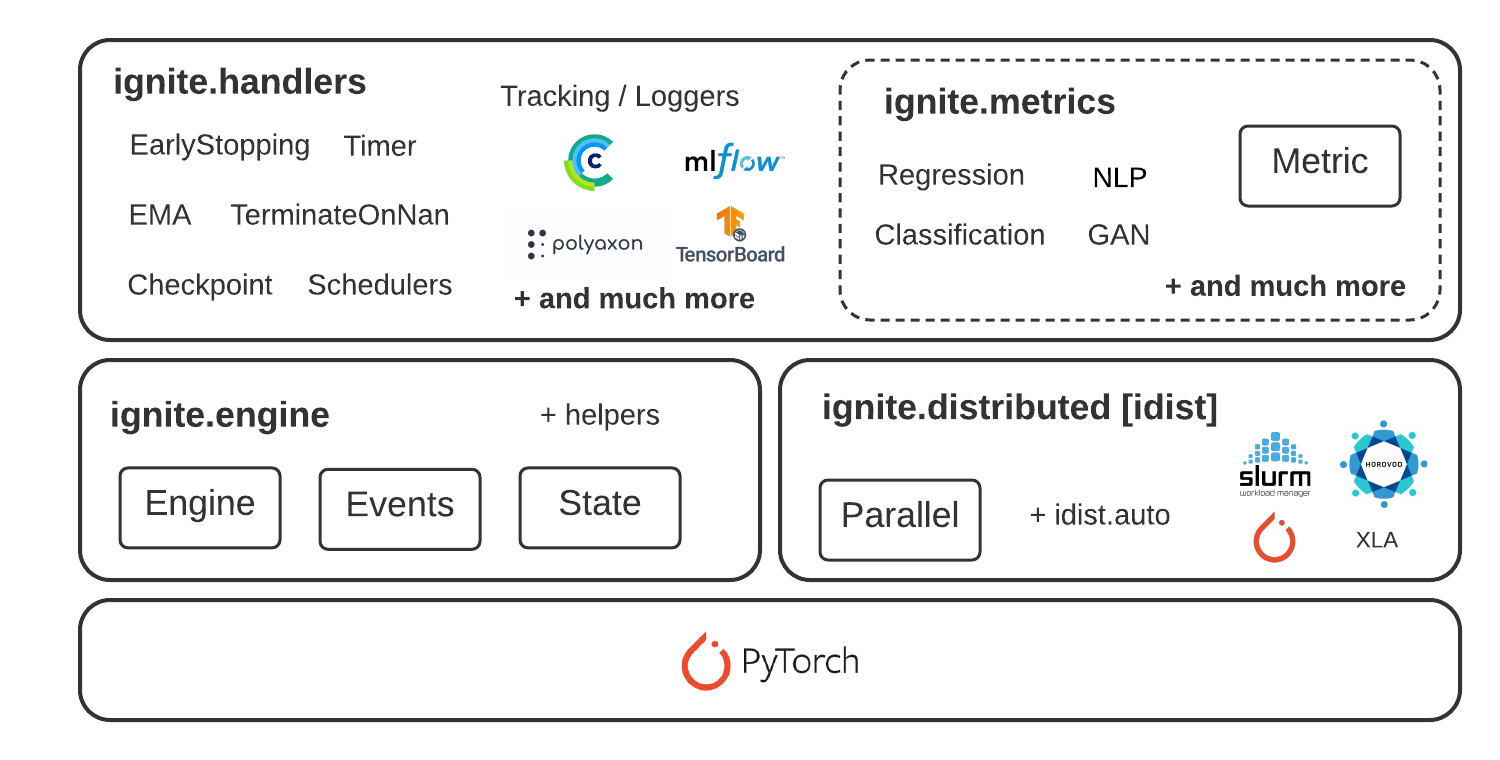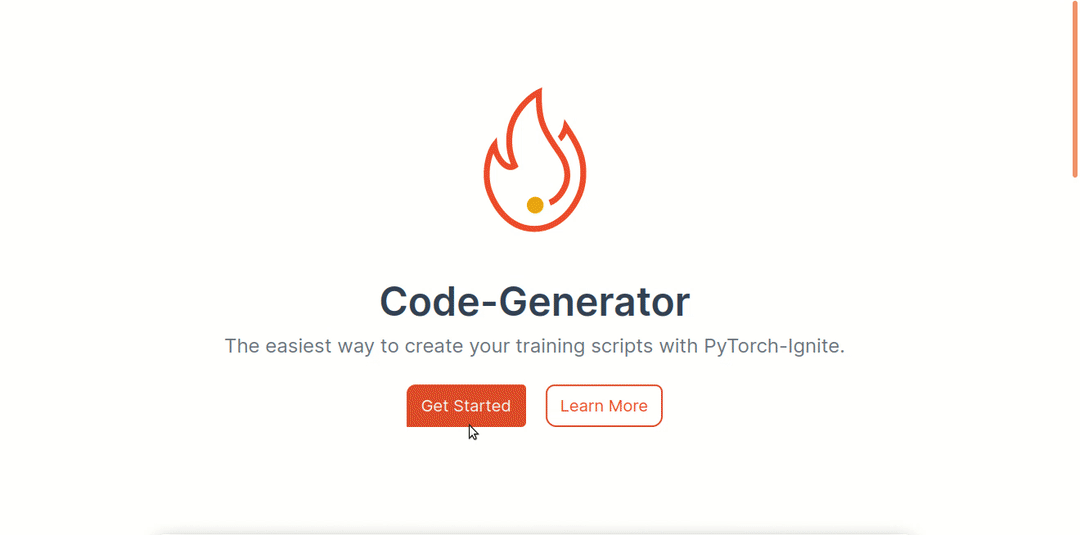PyTorch-Ignite
Training and evaluating neural networks flexibly and transparently
Victor, Sylvain & Taras
Slides: https://vfdev-5.github.io/ptcv21-pytorch-ignite-slides
Content
- PyTorch-Ignite: what and why?
- Quick-start example
- Convert PyTorch to Ignite
- About the project
PyTorch-Ignite: what and why? 🤔
High-level library to help with training and evaluating neural networks in PyTorch flexibly and transparently.
| | |
What makes PyTorch-Ignite unique ?
- Composable and interoperable components
- Simple and understandable code
- Open-source community involvement
Alice: How it differs from other similar project?
Bob: See other PyTorch Community Voices editions :)
Key concepts in a nutshell
PyTorch-Ignite is about:
- Engine and Event System
- Out-of-the-box metrics to easily evaluate models
- Built-in handlers to compose training pipeline
- Distributed Training support
Engine and Event System
.
| In its simpliest form: |
Simplified training and validation loop
No more coding for/while loops on epochs and iterations. Users instantiate engines and run them.
from ignite.engine import Engine, Events, create_supervised_evaluator
from ignite.metrics import Accuracy
# Setup training engine:
def train_step(engine, batch):
# Users can do whatever they need on a single iteration
# Eg. forward/backward pass for any number of models, optimizers, etc.
# ...
trainer = Engine(train_step)
# Setup single model evaluation engine
evaluator = create_supervised_evaluator(model, metrics={"accuracy": Accuracy()})
def validation():
state = evaluator.run(validation_data_loader)
# print computed metrics
print(trainer.state.epoch, state.metrics)
# Run model's validation at the end of each epoch
trainer.add_event_handler(Events.EPOCH_COMPLETED, validation)
# Start the training
trainer.run(training_data_loader, max_epochs=100)
Power of Events & Handlers 🚀
1. Execute any number of functions whenever you wish
Handlers can be any function: e.g. lambda, simple function, class method, etc.
trainer.add_event_handler(Events.STARTED, lambda _: print("Start training"))
# attach handler with args, kwargs
mydata = [1, 2, 3, 4]
logger = ...
def on_training_ended(data):
print(f"Training is ended. mydata={data}")
# User can use variables from another scope
logger.info("Training is ended")
trainer.add_event_handler(Events.COMPLETED, on_training_ended, mydata)
# call any number of functions on a single event
trainer.add_event_handler(Events.COMPLETED, lambda engine: print(engine.state.times))
@trainer.on(Events.ITERATION_COMPLETED)
def log_something(engine):
print(engine.state.output)
Power of Events & Handlers
2. Built-in events filtering and stacking
# run the validation every 5 epochs
@trainer.on(Events.EPOCH_COMPLETED(every=5))
def run_validation():
# run validation
@trainer.on(Events.COMPLETED | Events.EPOCH_COMPLETED(every=10))
def run_another_validation():
# ...
# change some training variable once on 20th epoch
@trainer.on(Events.EPOCH_STARTED(once=20))
def change_training_variable():
# ...
# Trigger handler with customly defined frequency
@trainer.on(Events.ITERATION_COMPLETED(event_filter=first_x_iters))
def log_gradients():
# ...
Power of Events & Handlers
3. Custom events to go beyond standard events
from ignite.engine import EventEnum
# Define custom events
class BackpropEvents(EventEnum):
BACKWARD_STARTED = 'backward_started'
BACKWARD_COMPLETED = 'backward_completed'
OPTIM_STEP_COMPLETED = 'optim_step_completed'
def train_step(engine, batch):
# ...
loss = criterion(y_pred, y)
engine.fire_event(BackpropEvents.BACKWARD_STARTED)
loss.backward()
engine.fire_event(BackpropEvents.BACKWARD_COMPLETED)
optimizer.step()
engine.fire_event(BackpropEvents.OPTIM_STEP_COMPLETED)
# ...
trainer = Engine(train_step)
trainer.register_events(*BackpropEvents)
@trainer.on(BackpropEvents.BACKWARD_STARTED)
def function_before_backprop(engine):
# ...
Out-of-the-box metrics 📈
50+ distributed ready out-of-the-box metrics to easily evaluate models.
- Dedicated to many Deep Learning tasks
- Easily composable to assemble a custom metric
- Easily extendable to create custom metrics
precision = Precision(average=False)
recall = Recall(average=False)
F1_per_class = (precision * recall * 2 / (precision + recall))
F1_mean = F1_per_class.mean() # torch mean method
F1_mean.attach(engine, "F1")
Built-in Handlers
.
| |
Distributed Training support
Run the same code across all supported backends seamlessly
- Backends from native torch distributed configuration:
nccl,gloo,mpi - Horovod framework with
glooorncclcommunication backend - XLA on TPUs via
pytorch/xla
import ignite.distributed as idist
def training(local_rank, *args, **kwargs):
dataloder_train = idist.auto_dataloder(dataset, ...)
model = ...
model = idist.auto_model(model)
optimizer = ...
optimizer = idist.auto_optimizer(optimizer)
backend = 'nccl' # or 'gloo', 'horovod', 'xla-tpu' or None
with idist.Parallel(backend) as parallel:
parallel.run(training)
Distributed Training support
Distributed launchers
Handle distributed launchers with the same code
torch.multiprocessing.spawntorch.distributed.launchhorovodrunslurm
Distributed Training support
Unified Distributed API
High-level helper methods
idist.auto_model()idist.auto_optim()idist.auto_dataloader()
Collective operations
all_reduce,all_gather, and more
The Big Picture

Quick-start example 👩💻👨💻
Let’s train a MNIST classifier with PyTorch-Ignite!
Installation
With pip:
$ pip install pytorch-ignite
or with conda:
$ conda install ignite -c pytorch
Import, import, import…
import torch
from torch import nn
from torch.utils.data import DataLoader
from torchvision.datasets import MNIST
from torchvision.models import resnet18
from torchvision.transforms import Compose, Normalize, ToTensor
from ignite.engine import Events, create_supervised_trainer, create_supervised_evaluator
from ignite.metrics import Accuracy, Loss
from ignite.handlers import ModelCheckpoint
from ignite.contrib.handlers import TensorboardLogger
Start with a PyTorch code
data_transform = Compose([ToTensor(), Normalize((0.1307,), (0.3081,))])
train_dataset = MNIST(download=True, root=".", transform=data_transform, train=True)
val_dataset = MNIST(download=True, root=".", transform=data_transform, train=False)
train_loader = DataLoader(train_dataset, batch_size=128, shuffle=True)
val_loader = DataLoader(val_dataset, batch_size=256, shuffle=False)
class Net(nn.Module):
def __init__(self):
super(Net, self).__init__()
self.model = resnet18(num_classes=10)
self.model.conv1 = nn.Conv2d(1, 64, kernel_size=3, padding=1, bias=False)
def forward(self, x):
return self.model(x)
device = "cuda"
model = Net().to(device)
optimizer = torch.optim.RMSprop(model.parameters(), lr=0.005)
criterion = nn.CrossEntropyLoss()
Here goes PyTorch-Ignite!
trainer = create_supervised_trainer(model, optimizer, criterion, device)
val_metrics = {
"accuracy": Accuracy(),
"loss": Loss(criterion)
}
evaluator = create_supervised_evaluator(model, metrics=val_metrics, device=device)
trainerengine to train the modelevaluatorengine to compute metrics on validation set + save the best models
Add handlers for logging the progress
@trainer.on(Events.ITERATION_COMPLETED(every=100))
def log_training_loss(engine):
print(f"Epoch[{engine.state.epoch}], Iter[{engine.state.iteration}] Loss: {engine.state.output:.2f}")
@trainer.on(Events.EPOCH_COMPLETED)
def log_validation_results(trainer):
evaluator.run(val_loader)
metrics = evaluator.state.metrics
print(f"Validation Results - Epoch[{trainer.state.epoch}] "
f"Avg accuracy: {metrics['accuracy']:.2f} "
f"Avg loss: {metrics['loss']:.2f}")
Add ModelCheckpoint handler with accuracy as a score function
model_checkpoint = ModelCheckpoint(
"checkpoint",
n_saved=2,
filename_prefix="best",
score_function=lambda e: e.state.metrics["accuracy"],
score_name="accuracy",
)
evaluator.add_event_handler(Events.COMPLETED, model_checkpoint, {"model": model})
Add Tensorboard Logger
tb_logger = TensorboardLogger(log_dir="tb-logger")
tb_logger.attach_output_handler(
trainer,
event_name=Events.ITERATION_COMPLETED(every=100),
tag="training",
output_transform=lambda loss: {"batch_loss": loss},
)
tb_logger.attach_output_handler(
evaluator,
event_name=Events.EPOCH_COMPLETED,
tag="validation",
metric_names="all",
global_step_transform=global_step_from_engine(trainer)
)
🚀Liftoff!🚀
trainer.run(train_loader, max_epochs=5)
Epoch[1], Iter[100] Loss: 0.19
Epoch[1], Iter[200] Loss: 0.13
Epoch[1], Iter[300] Loss: 0.08
Epoch[1], Iter[400] Loss: 0.11
Training Results - Epoch[1] Avg accuracy: 0.97 Avg loss: 0.09
Validation Results - Epoch[1] Avg accuracy: 0.97 Avg loss: 0.08
...
Epoch[5], Iter[1900] Loss: 0.02
Epoch[5], Iter[2000] Loss: 0.11
Epoch[5], Iter[2100] Loss: 0.05
Epoch[5], Iter[2200] Loss: 0.02
Epoch[5], Iter[2300] Loss: 0.01
Training Results - Epoch[5] Avg accuracy: 0.99 Avg loss: 0.02
Validation Results - Epoch[5] Avg accuracy: 0.99 Avg loss: 0.03
Complete code
PyTorch-Ignite Code-Generator

https://code-generator.pytorch-ignite.ai/
What is Code-Generator?: web app to quickly produce quick-start python code for common training tasks in deep learning.
Why to use Code-Generator?: start working on a task without rewriting everything from scratch.
🔥 Convert PyTorch to Ignite ❤️🔥
How to translate pure PyTorch code to PyTorch+Ignite










About “PyTorch-Ignite” project
Community-driven open source and NumFOCUS Affiliated Project
maintained by volunteers in the PyTorch community:
@vfdev-5, @ydcjeff, @KickItLikeShika, @sdesrozis, @alykhantejani, @anmolsjoshi,
@trsvchn, @Moh-Yakoub, ..., @fco-dv, @gucifer, @Priyansi, ...



With the support of:




Projects using PyTorch-Ignite
- Research Papers
- Blog articles, tutorials, books
- Toolkits
- Project MONAI, Nussl, …
More details here: https://pytorch-ignite.ai/ecosystem/
Community Engagement
Google Summer of Code 2021
- Mentored two great students (Ahmed and Arpan)
Google Season of Docs 2021
- Working with great tech writer (Priyansi)
Hacktoberfest 2020 and coming up 2021
PyData Global Mentored Sprint 2020
Our new website development (thanks to Jeff Yang!)
Stay tuned for upcoming events …



Join the PyTorch-Ignite Community
We are looking for motivated contributors to help out with the project.
 Everyone is welcome to contribute
Everyone is welcome to contribute

How to start:
- Read our Contributing guides
- Pick List of Help-wanted GH issue
- Reach out to us on GH or Discord for more guidance
Thanks for watchingand listening !Questions? 🙋👩💻🙋👨💻👩💻 | Follow us on and check out our new website: |